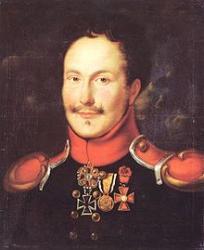- |
User Links
My Savior, What Thou Didst of Old
My Savior, what Thou didst of old
Author: Friedrich Heinrich Karl, Freiherr de La Motte-Fouqué; Translator: Catherine Winkworth (1855)Published in 7 hymnals
Representative Text
My Saviour, what Thou didst of old,
When thou wast dwelling here,
Thou doest yet for them, who bold
In faith to Thee draw near.
As thou hadst pity on the blind,
According to Thy Word,
Thou sufferedst me Thy grace to find,
Thy Light hast on me poured.
Mourning I sat beside the way,
In sightless gloom apart,
And sadness heavy on me lay,
And longing gnawed my heart;
I heard the music of the psalms
Thy people sang to Thee,
I felt the waving of their palms,
And yet I could not see.
My pain grew more than I could bear,
Too keen my grief became,
Then I took heart in my despair
To call upon Thy name;
"O Son of David, save and heal,
As Thou so oft hast done!
O dearest Jesus, let me feel
My load of darkness gone."
And ever weeping as I spoke
With bitter prayers and sighs,
My stony heart grew soft and broke,
More earnest yet my cries.
A sudden answer stilled my fear,
For it was said to me,
"O poor blind man, be of good cheer,
Rejoice, He calleth thee."
I felt, Lord, that Thou stoodest still,
Groping Thy feet I sought,
From off me fell my old self-will,
A change came o'er my thought.
Thou saidst, "What is it thou wouldst have?"
"Lord, that I might have sight;
To see Thy countenance I crave:"
"So be it, have thou Light."
And words of Thine can never fail,
My fears are past and o'er;
My soul is glad with light, the veil
Is on my heart no more.
Thou blessest me, and forth I fare
Free from my old discrace,
And follow on with joy where'er
Thy footsteps, Lord, I trace.
Source: Lyra Germanica: The Christian Year #22
Author: Friedrich Heinrich Karl, Freiherr de La Motte-Fouqué
 Fouqué, Friedrich Heinrich Carl de la Motte, was born Feb. 12,1777, at Brandenburg on the Havel, where his father, of an ancient and noble Huguenot family, was a retired officer of dragoons. Educated under the training of the French Reformed Church, it was intended that he should enter the University of Halle as a student of law. By his own preference however he entered the army, and in 1794 was appointed cornet in the Duke of Weimar's regiment of cuirassiers. In 1803 he married and retired to Nennhausen near Rathenow, Brandenburg. When, in March, 1813, the King of Prussia invited his people to arm against France, Fouqué offered himself as a volunteer and served as a lieutenant of cavalry till he was disabled at the battle of Lützen, May… Go to person page >
Fouqué, Friedrich Heinrich Carl de la Motte, was born Feb. 12,1777, at Brandenburg on the Havel, where his father, of an ancient and noble Huguenot family, was a retired officer of dragoons. Educated under the training of the French Reformed Church, it was intended that he should enter the University of Halle as a student of law. By his own preference however he entered the army, and in 1794 was appointed cornet in the Duke of Weimar's regiment of cuirassiers. In 1803 he married and retired to Nennhausen near Rathenow, Brandenburg. When, in March, 1813, the King of Prussia invited his people to arm against France, Fouqué offered himself as a volunteer and served as a lieutenant of cavalry till he was disabled at the battle of Lützen, May… Go to person page >Translator: Catherine Winkworth
 Catherine Winkworth (b. Holborn, London, England, 1827; d. Monnetier, Savoy, France, 1878) is well known for her English translations of German hymns; her translations were polished and yet remained close to the original. Educated initially by her mother, she lived with relatives in Dresden, Germany, in 1845, where she acquired her knowledge of German and interest in German hymnody. After residing near Manchester until 1862, she moved to Clifton, near Bristol. A pioneer in promoting women's rights, Winkworth put much of her energy into the encouragement of higher education for women. She translated a large number of German hymn texts from hymnals owned by a friend, Baron Bunsen. Though often altered, these translations continue to be used i… Go to person page >
Catherine Winkworth (b. Holborn, London, England, 1827; d. Monnetier, Savoy, France, 1878) is well known for her English translations of German hymns; her translations were polished and yet remained close to the original. Educated initially by her mother, she lived with relatives in Dresden, Germany, in 1845, where she acquired her knowledge of German and interest in German hymnody. After residing near Manchester until 1862, she moved to Clifton, near Bristol. A pioneer in promoting women's rights, Winkworth put much of her energy into the encouragement of higher education for women. She translated a large number of German hymn texts from hymnals owned by a friend, Baron Bunsen. Though often altered, these translations continue to be used i… Go to person page >Text Information
| First Line: | My Savior, what Thou didst of old |
| Title: | My Savior, What Thou Didst of Old |
| German Title: | Was du vor tausend Jahren |
| Author: | Friedrich Heinrich Karl, Freiherr de La Motte-Fouqué |
| Translator: | Catherine Winkworth (1855) |
| Meter: | 8.6.8.6 |
| Language: | English |
| Copyright: | Public Domain |


 My Starred Hymns
My Starred Hymns


